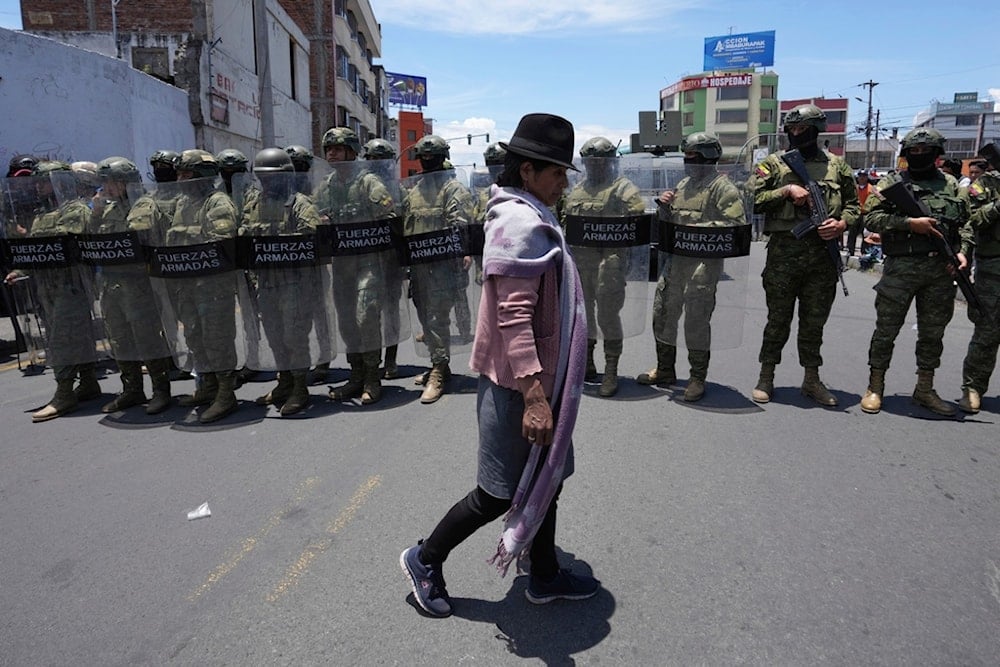Ecuador indigenous groups decry repression, internet blackouts
Indigenous groups in Ecuador accuse President Daniel Noboa's government of repression, power cuts, and internet shutdowns amid deadly protests over fuel subsidy removals.
-

Soldiers stand guard during an Indigenous anti-government protest in Latacunga, Ecuador, Monday, September 22, 2025. (AP Photo/Dolores Ochoa)
The Confederation of Indigenous Nationalities of Ecuador (CONAIE) has accused President Daniel Noboa's government of intensifying repression amid nationwide protests, including deliberate cuts to electricity, phone signal, and internet access in key areas of mobilization.
In a statement released Sunday via social media, CONAIE condemned what it described as an attempt by the state to "silence the complaints" of Indigenous communities. "The government turns off the lights, blocks social media, and cuts the signal to silence the complaints," the group warned, pointing specifically to El Cajas, the current epicenter of the protests.
State-crime unrest
The unrest escalated dramatically following the killing of Kichwa leader Efraín Fuerez, reportedly shot by members of the Armed Forces. CONAIE has labeled the killing a "state crime" executed under direct presidential orders, with the incident galvanizing Indigenous movements and sparking renewed anger across the country.
So far, one person has been killed and over 100 individuals detained during the protests. Among the detainees, at least 12 are facing terrorism charges and have been placed in pretrial detention. The province of Imbabura, in northern Ecuador, has emerged as the main stronghold of the indefinite national strike called by CONAIE. Road blockades also remain active in El Cajas and other regions.
Este es el resultado de gobernar de espaldas al pueblo ecuatoriano: asesinar a un valiente comunero, Efraín Fuerez. Hoy, en Imbabura, la gente le planta cara al fascismo. pic.twitter.com/8Udtye2QAM
— Daniel Granja (@DanielGranjaEc) September 30, 2025
Earlier in the day, the first protest-related fatality occurred in the town of Otavalo, where a demonstrator was reportedly shot dead by military forces.
The government has responded with a heavy-handed crackdown, deploying security forces and armored vehicles across various regions. The administration has shown no public intention of initiating dialogue with Indigenous leaders, opting instead for a show of force.
#ECUADOR || ¡LUTO EN #OTAVALO! por primer comunero ecuatoriano en #morir durante este paro Nacional.
— Así Pasa Noticias (@APCS_Podcast) September 28, 2025
Efraín F., dirigente de las comunidades de Cuicocha e integrante de la UNORCAC, falleció tras recibir un impacto de bala de las FFAA.#AsiPasaNoticias pic.twitter.com/60kLGB2dqk
Fuel Subsidy Uprising
The current wave of protests was triggered by the government's elimination of diesel subsidies two weeks ago. Fuel prices jumped from $1.80 to $2.80 per gallon, prompting a wave of discontent from both Indigenous and labor sectors across several provinces.
CONAIE is demanding the immediate repeal of the subsidy-cutting decree and the release of all detained protesters as a precondition for any negotiations.
Over the weekend, protests intensified at more than 50 locations across the country. In response, the government resorted to militarizing towns, occupying populated areas, cutting internet service in some communities, and threatening further crackdowns under the banner of combating "terrorism."
CONAIE, a key political force in Ecuador's recent history, now finds itself confronting an administration pursuing aggressive neoliberal reforms. The conflict unfolds within a broader regional context marked by social unrest and growing tensions over energy sovereignty and state repression.
Read more: US bases in Ecuador spark sovereignty debate under Noboa presidency

 3 Min Read
3 Min Read









